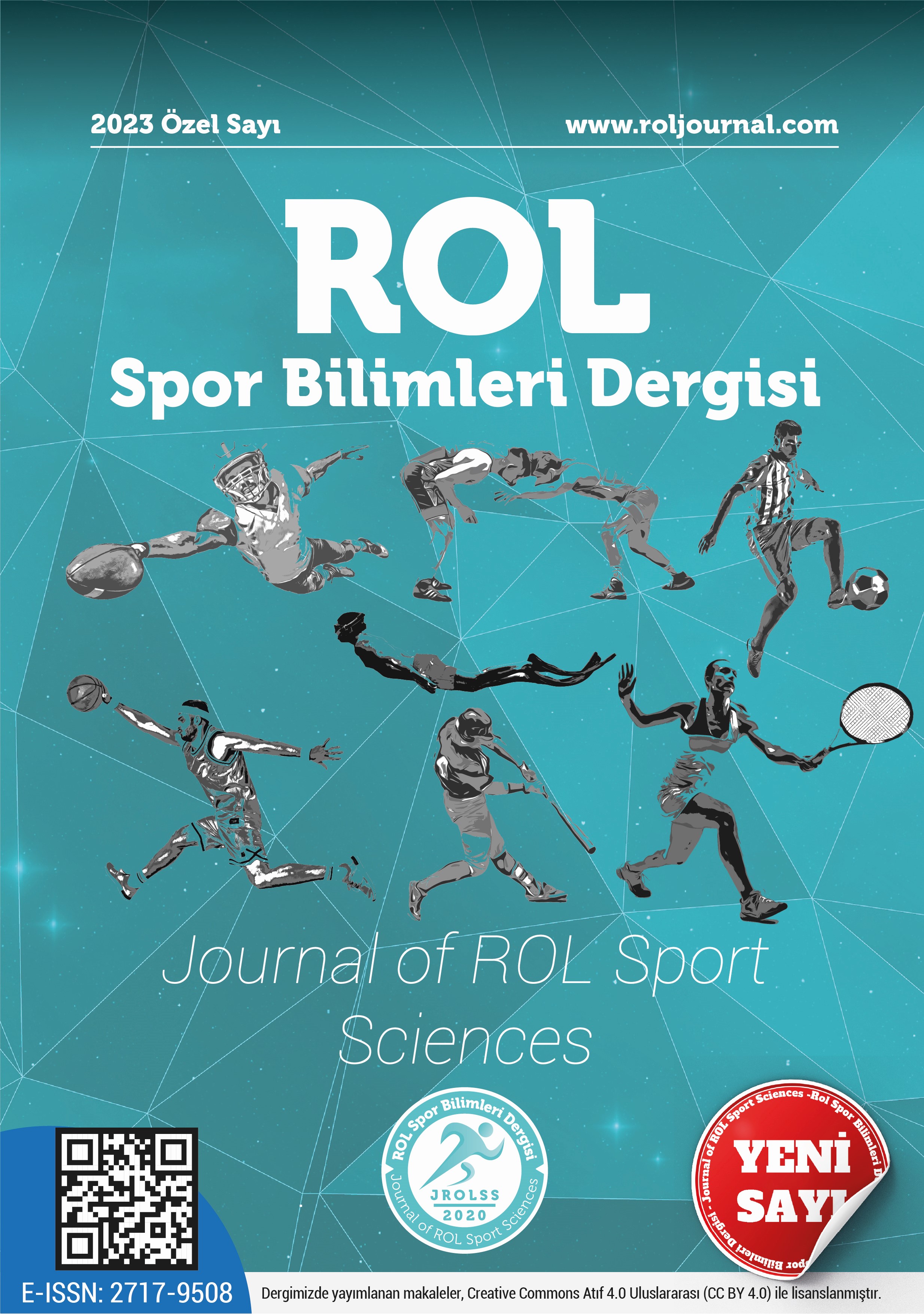Exploring the relationship between elite young athletes' irrational performance beliefs and sports goal orientation
DOI:
https://doi.org/10.5281/zenodo.10030263Keywords:
Elite young athletes, irrational performance beliefs, sports goal orientationAbstract
In this study, the aim was to examine the relationship between irrational performance beliefs and goal orientation in elite young athletes. The study group consisted of 238 actively licensed male athletes (age = 19.31 ± 3.14). In the research, The Task and Ego Orientation in Sport Questionnaire (TEOSQ) and the Irrational Performance Beliefs Inventory-2 (IPBI-2) were used. Descriptive statistics and Pearson Product-Moment Correlation Coefficients were used to analyze the obtained data set. The analysis revealed a positive relationship between the goal orientation scale and the ego orientation and task orientation sub-dimensions, and the irrational performance beliefs inventory's demand for approval, catastrophizing, low frustration tolerance, and devaluing sub-dimensions, as well as the total IPBI score (p<0.05). In conclusion, it is believed that goal orientation sub-dimensions, namely task orientation and ego orientation, are related to levels of irrational performance beliefs.
References
Arıburun, B., & Aşçı, F. H. (2005). Amerı̇kan futbolu oyuncularında hedef yönelı̇mı̇ ve algılanan güdüsel ı̇klı̇m. Spormetre Beden Eğitimi ve Spor Bilimleri Dergisi, 3(3), 111-114.
Ayas, H., & Biçer, T. (2011). Geçmişte lisanslı basketbol oynayan bireylerin hedef yönelimleri ve sporu sürdürme biçimleri ı̇lişkisinin ı̇ncelenmesi. İnsan ve Sosyal Bilimler Dergisi (JOHASS), 4(1), 220-229.
Büyüköztürk, Ş. (2016). Sosyal bilimler için veri analizi el kitabı istatistik, araştırma deseni spss uygulamaları ve yorum. Pegem Yayıncılık.
David, D., Szentagotai, A., Eva, K., & Macavei, B. (2005). A synopsis of rational-emotive behavior therapy (REBT): Fundamental and applied research. Journal of Rational Emotive ve Cognitive-Behavior Therapy, 23, 175-221.
Duda, J. L. (1989). Goal perspectives, participation and persistence in sport. International Journal of Sport Psychology, (20), 42-56.
Duda, J. L., & John, G. N. (1992). Dimensions of achievement motivation in schoolwork and sport. Journal of Educational Psychology, 84(3), 290-299.
Fadare, A. S., Langco, L., Canalija, C., Kabirun, C. A., & Abelardo-Sabandija, B. J. (2022). Athletes' confidence and anxiety management: A review in achieving optimal sport performance. International Journal of Science and Management Studies, 5(4), 311-318.
Genç, N., Yıldırım, Y., & Müftüoğlu, N. E. (2018). Veteran badmintoncularda hedef yönelimleri ile yaşam doyumu ilişkisi. Türkiye Spor Bilimleri Dergisi, 2(1), 26-33.
Izard, C. E. (2009). Emotion theory and research: Highlights, unanswered questions, and emerging issues. Annual Review of Psychology, (60), 1-25.
Jagacinski, C. M., & Nicholls J. G. (1984). Conceptions of ability and related affects in task involvement and ego involvement. Journal Educational Psychology, (5), 909-919.
Jagacinski, C, M., & Strickland, O. J. (2000). Task and ego orientation: The role of goal orientations in anticipated affective reactions to achievement outcomes. Learning and Individual Differences, (12), 189-208.
Korkmaz, C., Toy, A. B., & Bozkurt, H. (2022). Amatör genç sporcuların akıldışı performans i̇nançlarının çeşı̇tlı̇ değı̇şkenler açısından karşılaştırılması. Bilimsel Eğitim Araştırmaları, 6(2), 346-362.
Lochbaum, M. R., & Roberts, G. C. (1993). Goal orientations and perceptions of the sport experience. Journal of Sport ve Exercise Psychology, (15), 160-171.
MacIntyre, T. E., Van Raalte, J., Brewer, B. W., Jones, M., O’Shea, D., & McCarthy, P. J. (2018). Mental health challenges in elite sport: Balancing risk with reward. Frontiers Media SA.
Nicholls, J. G., Michael, P., & Susan, B. N. (1985). Adolescents theories of education. Journal of Educational Psychology, (77), 683-692.
Orhan, S., & Ünlü, H. (2022). Futbolcularda zihinsel dayanıklılık ve hedef yöneliminin akıl dışı performans inançları ile ilişkisi: kesitsel çalışma. Türkiye Klinikleri Spor Bilimleri Dergisi, 14(1), 11-21.
Peat, J., & Barton, B. (2005). Medical statistics: A guide to data analysis and critical appraisal. John Wiley & Sons.
Raglin, J. S., & Hanin, Y. L. (2000). Emotions in sport. Human Kinetics.
Reardon, C. L., & Factor, R. M. (2010). Sport psychiatry: a systematic review of diagnosis and medical treatment of mental illness in athletes. Sports Medicine, 40, 961-980.
Roberts, G. C., & Ommundsen, Y. (2007). Effect of goal orientation on achievement beliefs, cognition and strategies in team sport. Scandinavian Journal of Medicine & Science in Sports, 6(1), 46-56.
Şentürk, E., & Özmutlu, İ. (2023). Okçuluk sporcularının sporda i̇mgeleme becerilerinin hedef yönelimi düzeylerine etkisinin i̇ncelenmesi. Çomü Spor Bı̇lı̇mlerı̇ Dergı̇si, 6(1), 73-89.
Toros, T. (2004). Sporda görev ve ego yönelim ölçeği -sgeyö-nin Türk sporcuları için güvenirlik ve geçerlik çalışması. Spor Bilimleri Dergisi, 15(3), 155-166.
Toros, T., & Koruç, Z. (2005). Hedef yönelimleri ve algılanan motivasyonel iklim arasındaki ilişki (liseli erkek voleybolcular üzerine bir çalışma). Spor Bilimleri Dergisi, 16(3), 135-145.
Torus, T., Akyüz, U., Bayansalduz, M., & Soyer, F. (2010). Görev ve ego yönelimli hedeflerin yaşam doyumu ile ilişkisinin incelenmesi (Dağcılık Sporu Yapanlarla İlgili Bir Çalışma). Uluslararası İnsan Bilimleri Dergisi, 7(2), 1039-1050.
Toros, T., & Duvan, A. (2011). Eskrı̇mcı̇lerde algılanan antrenörlük davranışı, kolektı̇f yeterlı̇k ve hedef yönelı̇mlerı̇ arasındakı̇ i̇lı̇şkı̇. Niğde Üniversitesi Beden Eğitimi ve Spor Bilimleri Dergisi, 5(1), 33-41.
Toros, T. (2012). Elit ve elit olmayan erkek basketbolcularda hedef yönelimi, güdüsel (motivasyonel) iklim ve yaşam doyumu. Spor Bilimleri Dergisi, 13(3), 24-36.
Toy, A. B. (2021). Akılcı duygusal davranışçı yaklaşım temelli psiko-eğitim programının sporda kaygı ve akıldışı performans ı̇nançları üzerine etkisi [Doktora tezi, Mersin Üniversitesi]. Eğitim Bilimleri Enstitüsü.
Toy, A. B., Güney, G., & Coşgun, B. (2022). Genç sporcuların akıldışı performans inançlarının incelenmesi. Journal of Advanced Education Studies, 4(1), 47-60.
Toy, A. B. (2023). Milli takım güreşçilerinin akıldışı performans inançlarının çeşitli değişkenler açısından karşılaştırılması. Egzersiz ve Spor Bilimleri Araştırmaları Dergisi, 3(1), 14-22.
Turner, M. J., & Allen, M. S. (2018). Confirmatory factor analysis of the irrational performance beliefs ınventory (ipbı) in a sample of amateur and semi-professional athletes. Psychology of Sport and Exercise, 35, 126-130.
Turner, M. J., & Barker, J. B. (2014). Using rational emotive behavior therapy with athletes. The Sport Psychologist, 28(1), 75–90
Urfa, O., & Aşçı, F. H. (2018). Spor yapan ve yapmayan ergenlerı̇n akıldışı ı̇nançlarının karşılaştırılması. Atatürk Üniversitesi Beden Eğitimi ve Spor Bilimleri Dergisi, 20(2), 41-52.
Weinberg, R. S., & Gould, D. (2015). Foundations of sport & exercise psychology. Human Kinetics.
Downloads
Published
How to Cite
Issue
Section
License
Copyright (c) 2023 Journal of ROL Sport Sciences

This work is licensed under a Creative Commons Attribution 4.0 International License.

